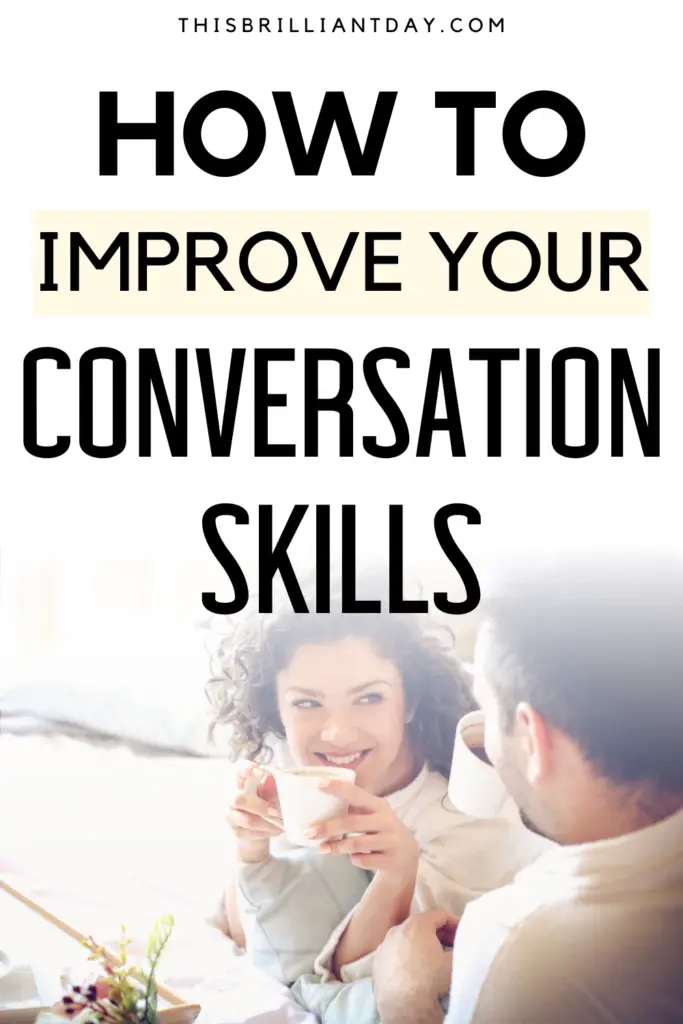Conversation skills don’t come naturally to everyone. Some people, including myself, find conversations hard work at times and don’t always know what to say to people. I would class myself as an introvert, and I also experience social anxiety to some degree in many of my social interactions, which doesn’t help! However, I believe that conversation skills can improve with practice, and they are worth working on because conversations can be really rewarding and enjoyable when they go well and flow naturally.
Over the years, I have built up a few skills that have helped me to become better at conversations, even when I am feeling anxious. The tips I will share in this blog post will apply to anyone who wants to improve their conversation skills, but they will be especially relevant to people with social anxiety and anyone else who finds conversations particularly difficult.
I will mostly refer to casual conversations where you are talking to a friend. But most of the points in this post will apply to more formal conversations too, as well as group conversations with multiple friends, family members or colleagues.
These tips apply to video calls as well as in-person conversations. For more specific tips for coping with video calls, have a look at my post: How To Overcome Video Call Anxiety

Top Tips for Improving Your Conversation Skills
Make a list of conversation topics in advance
Before meeting with or video calling a friend, I recommend writing down a list of conversation topics in advance. These can include things you have done recently to tell your friend about, as well as questions to ask your friend. You can do this in a note on your phone, or on a piece of paper. If your friend goes to the loo or goes to get a drink, you can subtly check your list and refresh your mind with topics to talk about. On a video call, you can stick your list to the wall in front of you so you can check it during the call.
It doesn’t matter if you don’t get through all the conversation topics that you wrote down. It’s just there in case the conversation runs dry and you need a prompt.
Don’t be afraid of starting ‘random’ topics
It’s okay to pick a topic out of the air that feels quite random and unrelated to the other things you’ve been talking about. For example, you could ask, ‘do you like musicals?’ or ‘have you tried this brand of cough sweet?’ or ‘what drink do you normally get from a coffee shop?’. Random topics are actually a good thing because the other person probably hasn’t chatted about that thing before, or very often, so it will be a refreshing and interesting conversation for you both.
Don’t be afraid of asking ‘silly’ questions
Most questions are not actually silly at all – they just help you to go into more detail on a topic. For example, in a recent video call, a friend told me she was knitting a scarf. The question ‘what colour is it?’ came into my head so I went ahead and asked it. At the time, it felt like a silly and simplistic question to me, but it actually shows that I was taking an interest in what my friend was saying, and wanting to know more detail.

Don’t be afraid to admit a lack of knowledge
If your friend is telling you about something that you don’t know much about or don’t understand, you don’t have to nod along and pretend you know what they are talking about. That will only kill the conversation as you won’t have anything to say. It’s okay to admit you don’t know about the topic and ask them to explain it to you. That will keep the conversation going and you will learn something new!
Don’t second guess yourself
Sometimes when I am having a conversation with someone, I’ll think of something to say, but I take too long deciding whether it’s a good thing to say or not. Obviously, it’s important to have a filter and make sure that what you say is appropriate. But in general, if you think of a question or comment, even if it seems a bit silly, go for it and say it rather than weighing it up in your mind and second-guessing yourself. Otherwise, the moment will pass and you’ll miss the opportunity.
Be present in the moment
Focus on the other person and listen to what they are saying, and also focus on your surroundings. Don’t think about what might happen later or your worries about the future. Just be present in the conversation.
If you are on a video call, it’s helpful to remove your own face from the corner of the screen, if the settings allow you to do so. This helps you to focus more easily on the other person, rather than on yourself and how you look.
Be a good listener
I think that listening is a skill that takes practice, but anyone can be a good listener. The key is letting go and not being attached to the things you want to say. Focus wholeheartedly on what the other person is saying, and respond when they finish, even if they have gone onto another topic by then. You will probably think of things to say while they are talking, but don’t interrupt them. If you try to hold on to and remember everything you wanted to say, then you won’t be able to concentrate on what the other person is saying because you’ll just be waiting for a gap so that you can say your bit before you forget.
Be open to forgetting some of the things you wanted to say. The conversation will flow better that way because you will be truly listening to the other person and responding directly to what they say. The conversation will move forward naturally instead of keeping on cycling back round to previous topics. Topics will naturally come back around later so you will have future opportunities to say the things you thought of.
Inevitably, the other person will sometimes interrupt you while you are talking. I think the best thing to do is to listen to them and go along with their interruption, even if you didn’t finish what you were saying. Let go of it – you are bound to have another opportunity to finish what you were saying later or in the future.

Take an interest in what the other person is saying
As well as listening properly, take an interest in what they are saying, especially when it’s something they are enthusiastic about. Ask them questions about the things they are telling you. Even if you are not overly interested in the topic, ask questions on aspects of it that you find the most interesting. By showing interest and asking questions you will keep the conversation flowing, as well as making the other person feel good.
It’s okay to be vulnerable
Don’t be afraid of being vulnerable, and sharing your feelings and emotions. This can sometimes be difficult, but it’s a good thing to get used to doing because then the other person will understand how you are feeling and why you might be acting a certain way. It allows you to be yourself rather than hiding your feelings and pretending everything is okay all the time.
This includes sharing if you are anxious. If you are open to doing that, you’re less likely to feel anxious at all because you don’t feel you have to hide it which can be anxiety-inducing in itself.
Another advantage of sharing your feelings and vulnerabilities with others is that they are more likely to feel comfortable opening up to you too. In this way, your friendship can deepen.
Ask the other person how they feel about something
Don’t be afraid to ask someone how they feel about something. Obviously, be sensitive, and don’t ask them about very personal or difficult topics that they probably wouldn’t want to talk about. But in general, it’s okay to ask people about their feelings. For example, if they are starting a new job soon, ask how they feel about leaving their old colleagues, or whether they are nervous about starting the new job. This opens a new and more personal dimension to the conversation rather than just talking about straight facts and events.
Do an activity
It’s a good idea to plan an activity to do with your friend, in addition to talking. This could be going to the shops, the cinema or getting some food or drinks together. In a video call, you could play a game or do a quiz together, or have a drink and snack while you are talking. This gives you a break from talking, gives you something else to talk about afterwards and makes the interaction feel more natural.

Try to remember the things they tell you
It’s a good idea to try to remember as many things as possible that your friend tells you, so you can ask them about those things next time. Remembering what they told you will help to strengthen the friendship and will provide continuity between your meet-ups. You can ask them specific questions about how certain situations are going in their lives, rather than starting fresh with small talk such as ‘what have you been up to?’ each time you meet up.
After you have said your goodbyes and parted ways, it’s a good idea to run your conversations through your head so you are more likely to remember what you talked about. You can even write down some notes if you like, and these can help you write your ‘conversation topic ideas’ for the next time you meet up.
I recently read a great book called Unlimited Memory which includes many techniques for strengthening your memory and remembering things that you are told. I’d recommend checking this book out, especially if you tend to easily forget what is going on in your friends’ lives.
Be yourself and be human
We all have human needs. If you need a drink, say so and get one. If you need the loo, go. If you need to cough or blow your nose, do so. You don’t have to stifle your humanity and needs for the sake of a ‘perfect’ interaction. You’ll make the other person feel more at ease too if you do normal human things like that.
I hope you have found these tips helpful for improving your conversation skills!
Would you consider yourself to be a good conversationalist? Did you learn anything new in this post? Do you have any other tips for improving your conversation skills? Let me know in the comments below!



These are great tips, it’s really helpful to understand it from this point of view!
Rosie
Thank you Rosie, I’m glad you enjoyed this post! x
I love that you pointed out that it’s okay to not have all the answers. Too often, I feel like people avoid conversations because they don’t know ‘enough’ to carry out a conversation, in their opinion. However, if you’re interested in the person and in finding out about what’s important to them, why not use it as a learning opportunity? Ask questions, admit what you don’t know and give them a chance to share their expertise and knowledge. People LOVE that! It’s a great way to break the ice too.
I totally agree! I used to feel too self-conscious to admit that I didn’t know much about something – I would nod along and pretend that I did, or just keep silent in a group. But it makes a lot more sense to use it as a learning opportunity, and like you say, people love sharing their knowledge!
I feel like I have always been a pretty good listener but I have known so many people in my time that could use this information to help them. I still also think I could use this helpful post to improve myself.
It’s great that you are a good listener! I’m so glad that you have found this post helpful.